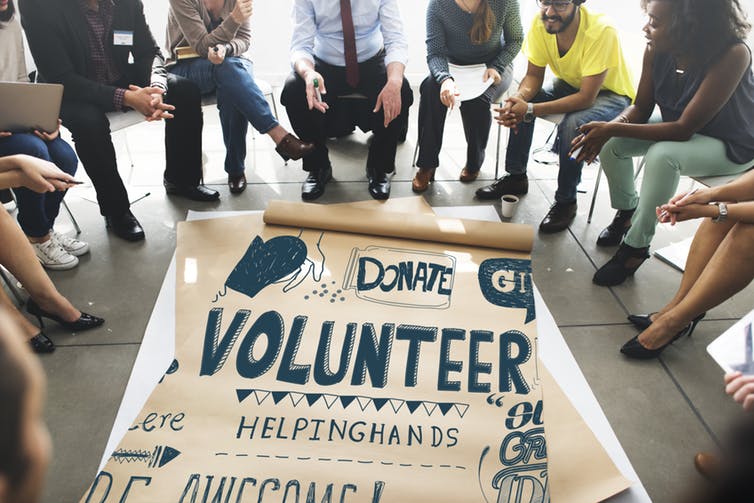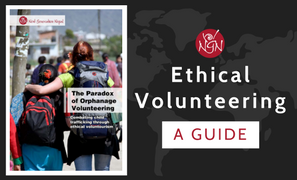I have always been a firm believer that you should help others where you can give. Giving and volunteering are and have always been key ways to do this. But can volunteering be negative in societies?
Voluntourism is an up and coming trend out of the eco-tourism movement. It is a great way to meet like-minded people. Instead of purchasing package resorts and trips, people decided they wanted a more unique experience and are willing to pay a lot of money for it too. Voluntourism is ‘volunteer tourism’ and is described as the practice of providing your time for the benefit of others whilst travelling internationally. It is not uncommon for businesses and charities in developing countries to run volunteer programs and collect money from it. Voluntourism may come from being good at heart but can cause negative consequences in their societies. Many see the voluntourism industry as self-centered and selfish, which highlights more about the actual benefit the volunteer is receiving than the help and care they are giving. In this opinion piece, I would like to discuss the negative and positive consequences of voluntourism, ways you can volunteer without long term harming effects and other ways you can contribute your valuable resources.
The simplest reason why organizations use overseas volunteers is that if a charity employs local workers for the labor, it would cost them. But if they use volunteers who pay to do the work, they are making money.
A week or even a month is simply not enough time for most volunteer work to have a lasting effect on the communities
Voluntourism stems from the white saviour culture, but there are better ways to support societies. Volunteering is one thing, paying spending money to volunteer, especially in orphanages in a whole different story. White culture in international development is about white western volunteers saving people, the belief that poorer countries and people of colour need to be saved. It also refers to westerners thinking they can ‘solve’ these issues and is believed to be from colonialism and Christian missions.
The psychological and emotional benefits of volunteering are evident, and this is being used as the main marketing strategy for the industry. The passion and care volunteers have is often very obvious, but the context of ‘saving’ often more selfish than good according to Dr. Sharon McLennan, a Massey University Lecturer on an opinion piece in a New Zealand newspaper. It is not intentionally selfish, but why you are doing it need to be personally and thoroughly assessed.
She mentions in particular, the organization ‘Mercy Ships’ which ‘helped’ Guinea, West Africa. She believes that most of the traumatic issues and conditions could have been solved with a properly sourced and strong healthcare system, instead of being interfered with by Mercy Ships. This is a factor of the legacy of colonization and the modern intervention in Africa.
Mercy Ships have previously had large inequality between the volunteers on the ship and the locals. There were a few reasons for this; the volunteers would ‘serve the poor’ by helping out during the day in the villages, but went back to their life of luxury on the ships and would not experience the direct consequences. Locals were also not allowed on the ship without special invitations and reasons to be on it, however, this is also partly due to maritime law. Apart from volunteering, there was little reason for people to leave the boat, mix with the locals and spend their economic resources to help out the economy. ‘I do not doubt that Mercy Ships changes the lives of individual patients and many volunteers for the better, often dramatically so. However, Mercy Ships remains, at its core, a conservative, Christian charity that perpetuates a white saviour culture. I think there are better ways to support people in places like Guinea’ She says.
A strong argument for voluntourism is that is often has a deep and meaningful impact on the volunteer. But is it really meaningful work if locals end up fixing the construction made by unskilled volunteers? Even volunteering can be seen as selfish if it is done for this very reason. True volunteering should be purely about giving back, especially if you have a skill that could make an impact on lives.
In 2018 The Guardian posted an article about the business of voluntourism which made a very valid point: Building houses and construction through unskilled volunteers can be incredibly expensive, and this is even if they are done properly. 162 Americas flew to Honduras after Hurricane Mitch in 2008 to help build houses that cost $30,000USD a house. But a local Christian charity could have built them for $2,000USD. Money goes a long way in poor countries, and if they had donated money rather than their direct time, 15times more houses could have been built at the same time.
One of the most dangerous ways to volunteer unskilled is in a children’s orphanage. Not only is it fundamentally wrong to parade these children’s around for tourists to see how fortunate they are, having new volunteers every other week has been proven to create a huge sense of abandonment in their life, especially because they do not have a strong everyday parent figure. An example of the effect voluntourism has is seen in a recent Unicef study that discovered that 75% of children in orphanages in Cambodia have living relatives. Despite this, orphanages are constantly being built through overseas donations, even though orphanages are illegal in most western countries. This showcases that they are being created specifically for this type of tourism, because ‘it feels good to help others’.
If you want to volunteer Dr. McLennan suggests that ‘if you want to make a difference, consider longer-term volunteering, or look for organizations which focus on mutual learning and understanding, and fostering self-sufficiency and empowerment rather than promising that individuals can make a difference in just a couple of weeks.’ Ensure that you are not destroying jobs of the locals by offering free, unqualified work such as teaching when qualified locals do not have the opportunity to be employed themselves.
If volunteering is something you are very passionate about and have something to offer, the advice is to be realistic. It should always be a relationship that is two ways at all times and always adjust your actions to make sure they are not harmful and dangerous, this is rarely anybody’s intention but can contribute negatively to society.
It is vital to also remember the voluntourism is not always bad, it can bring also bring positive things to culture, but the decision of volunteering needs to be well researched and thought constructively about how you are going to influence others. This article intends to not volunteer but to think constructively about how to give to create the best and most positive impact on others. You can donate money to reputable charities and organizations on the ground that know what these children and people need first hand, instead of donating items that they do not need. Keep in mind that sometimes the best way to support a country’s economy is to engage in tourist activities and experience their culture without destroying it.
https://theowp.org/the-dangers-of-the-voluntourism-industry/






